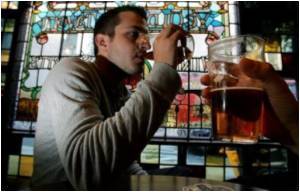A short term regime that aid alcoholics to stay sober was developed by Dutch and German psychologists.

"They deal with the reasons and strategies for sobriety," said lead author and University of Amsterdam experimental psychologist Reinout W. Wiers.
The CBM employs video-game-like 'approach-avoidance tasks' - pushing or pulling a joystick in response to images on a screen. Pulling zooms in on the image, as if the participant were 'approaching' it. Pushing zooms out, in 'avoidance'.
The team's previous studies found that heavier drinkers, when shown images of alcoholic beverages or soft drinks, are faster to 'pull' the alcohol than lighter drinkers, but CBM can turn this 'approach bias' into an 'avoidance bias'.
In this study, Wiers and his team recruited 214 inpatients at the Salus Clinic.
Three weeks after detoxification, the patients were assessed for their craving for alcohol, as well as their attraction to it, indicated by joystick and word-association tasks.
Advertisement
Four 15-minute sessions were conducted on four consecutive days.
Advertisement
The control groups showed no such changes.
Then the patients began abstinence-based cognitive behavior therapy, a structured method that helps people identify and challenge the thinking patterns that perpetuate their self-destructive behaviours.
Treatment lasted about three months. A year later, the researchers assessed the patients' success in staying sober.
Many patients had relapsed-but only 46 percent of the CBM trained group, compared with 59 percent of the others.
Although the researchers cannot be absolutely sure that CBM made the difference, joystick and word tests left them 'strongly confident', said Wiers, adding "this intervention to regular treatment helps people stay abstinent."
To further illustrate this point, Wiers quoted a story of one still-abstinent patient.
The man, who opened the refrigerator in search of a coke at a party, found it full of beer.
Immediately, he made the push movement -he closed the door.
"In the heat of the moment, when temptations is high, you have to take that immediate first step in the right direction or it becomes very difficult," said Wiers.
"CBM helps people take this step, before they have time to consciously think, 'Should I take a drink?'" he added.
The study is published in Psychological Science.
Source-ANI









